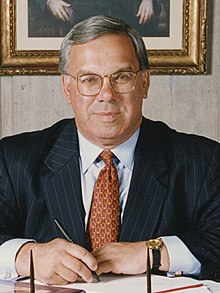
Back توماس مينينو Arabic توماس منینو AZB Thomas Menino German Thomas Menino Finnish Thomas Menino French Thomas Menino ID Thomas Menino Italian トーマス・メニーノ Japanese Thomas Menino Latin Thomas Menino Dutch
Thomas Menino | |
|---|---|
 Menino in his office, c. 1995–1998 | |
| Mayor of Boston | |
| In office November 16, 1993 – January 6, 2014 (acting: July 12, 1993 – November 16, 1993[1]) | |
| Preceded by | Raymond Flynn |
| Succeeded by | Marty Walsh |
| 60th President of the United States Conference of Mayors | |
| In office 2002–2003 | |
| Preceded by | Marc Morial |
| Succeeded by | James Garner |
| President of the Boston City Council | |
| In office January 1993 – March 1993 | |
| Preceded by | Dapper O'Neil |
| Succeeded by | James Kelly |
| Member of the Boston City Council for the 5th district | |
| In office 1984–1993 | |
| Preceded by | Constituency established |
| Succeeded by | Daniel F. Conley |
| Personal details | |
| Born | Thomas Michael Menino December 27, 1942 Boston, Massachusetts, U.S. |
| Died | October 30, 2014 (aged 71) Boston, Massachusetts, U.S. |
| Resting place | Fairview Cemetery |
| Political party | Democratic |
| Spouse |
Angela Faletra (m. 1966) |
| Children | 2 |
| Education | Mount Ida College (AA) University of Massachusetts Boston (BA) |
Thomas Michael Menino (December 27, 1942 – October 30, 2014) was an American politician who served as the mayor of Boston, from 1993 to 2014. He was the city's longest-serving mayor. He was elected mayor in 1993 after first serving three months in the position of "acting mayor" following the resignation of his predecessor Raymond Flynn (who had been appointed United States ambassador to the Holy See). Before serving as mayor, Menino was a member of the Boston City Council and had been elected president of the City Council in 1993.
Dubbed an "urban mechanic", Menino had a reputation for focusing on "nuts and bolts" issues and enjoyed very high public approval ratings as mayor. During his tenure, Boston saw a significant amount of new development, including the Seaport District, the redevelopment of Dudley Square (today known as "Nubian Square"), and the redevelopment of the area surrounding Fenway Park. However, during his mayoralty, gentrification priced some longtime residents out of neighborhoods, and allegations were made of favoritism by Menino towards certain developers. During Menino's tenure as mayor, crime in Boston fell to unprecedented lows, and the city came to rank among the safest large cities in the United States. Menino also undertook a number of environmentally-focused actions. In the last year of Menino's tenure, the city faced the Boston Marathon bombing, an incident of domestic terrorism.
Menino was a liberal member of the Democratic Party. Menino led a powerful political machine in Boston and also played roles in national politics, such as serving as president of the United States Conference of Mayors from 2002 to 2003, bringing the 2004 Democratic National Convention to Boston, and co-founding the group Mayors Against Illegal Guns with New York City Mayor Michael Bloomberg.
After the end of his mayoralty, he was appointed professor of the practice of political science at Boston University. He also served as co-founder and co-director of the Initiative on Cities, an urban leadership research center based at Boston University. Menino's post-mayoralty life was unexpectedly cut short as he was diagnosed with an advanced form of cancer of unknown primary origin in March 2014 and died from the disease seven months later.
- ^ McGrory, Brian (July 13, 1993). "Menino, 'a neighborhood guy,' now at center stage". The Boston Globe. p. 12. Retrieved June 11, 2021 – via newspapers.com.